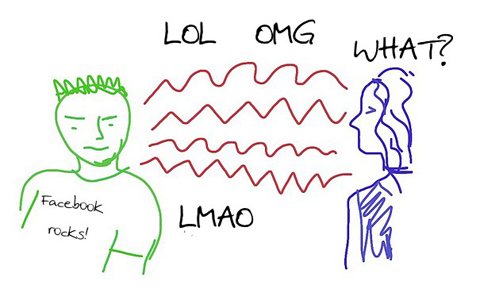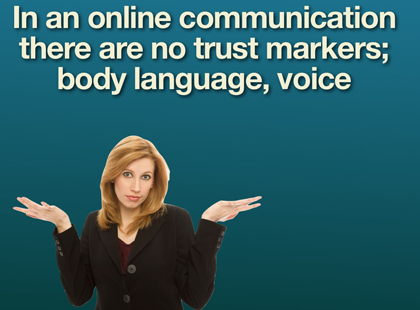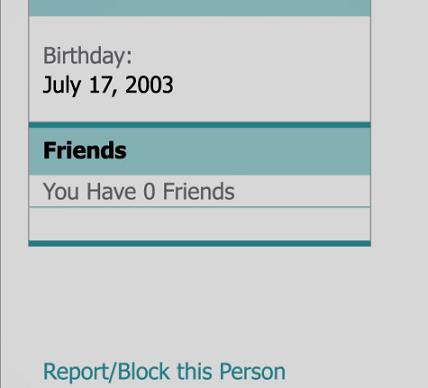As part of the so called “Facebook generation“ and having used the social network in its very infancy, I think I am fairly well placed to pass some judgment on the thoughts of my generation. This blog post is my personal thoughts on Facebook and its place in real-life relationships.
As of July 2010, 500 million people worldwide were actively using Facebook, up from 400 million in February 2010. Half of Facebook users log onto it everyday. More than 35 million update their statuses at least once a day. The average user spends 55 minutes per day on Facebook and has 130 friends
(Source: Facebook blog)
Facebook, has rapidly become a huge global success. I’m not going to openly dismiss the use of Facebook because it is a great tool that enables you to keep in touch with your friends all around the world quickly, interactively and easily. What I am discussing here, is a deeper underlying issue that Facebook has actually led to a breakdown in real socialising and face-to-face communication. That I believe to be true.
As a marketing platform, Facebook has endless opportunities to target its 400 + million members. Due to the amount of information we input into our Facebook profiles about our age, sex, location, likes and dislikes, religion, political status this allows for unique targeting options when advertising. It has help a large number of businesses in a lot of ways to establish a social presence and connect with customers further a field.
But what about the effect on real world relationships and socialising?
Communication Breakdown

Some would argue that Facebook has actually made it easier to maintain friendships and meet up with people in real life. There are many good things about Facebook, it is a great platform for sharing and collaborating on content, it is great to see pictures of your friends holidays, weddings, honeymoons etc and comment on them.. This all sounds great, surely there is a downside to all of this. Yes, there is!
– “The average Facebook user loses 23.333 hours a month on Facebook. What else could you be doing with that time?” Source: Mashable
I can think of plenty things I could be better doing with 23.333 hours a month. That’s quite a lot of time when you think about it logically.
I’m telling you from my experiences that hardly any of my friends will pick up the phone and communicate, thats just me, I’m sure there are plenty of others who feel the same. Only last week a good friend of mine told me, “Setup a Facebook event for the time/place of your event and invite me!”. Wouldn’t it be easier if you just sent me a text telling me you can make it or not? Why does everything have to be through Facebook?
Maybe I’m just being old fashioned, is it really that hard for people to pick up their phones and call their friends, for some maybe it is? Perhaps Facebook has become so accepted as the ‘norm’, that for some people it is considered to be the chosen no. 1 platform for communication in their personal lives.
Before Facebook everything was so easy, you called your friend and told them what time, date and place you were meeting them, then it would happen. Now you invite said friend to a Facebook event and it is all to easy to select the option ‘Maybe attending’. This shouldn’t even be an option, either your going or not. People should be forced to make a firm commitment on Facebook.
A Need for Trust in Online Communication
In a presentation on Social Media, I spoke about the need for trust online and that trust was a key factor for online communication. This is because you cannot see or hear a persons voice or body language. Things can easily be misinterpreted in online communication, think about the conversations you’ve had over e-mail or chat that have easily been misunderstood because you can’t hear that persons tone or voice.

Due to the faceless nature of an online interaction, people can easily say no or reject an invitation to connect in a real world situation. It gives too many people the easy way out, if you have got someone on the end of the phone or face-to-face its a lot more difficult to easily reject an invitation to socially connect. I’ll put my hands up and say I’ve been a culprit of this with a couple of Facebook events, leaving it last minute to un-attend.
The Darkside of Facebook
There are more than 60 million status updates on Facebook everyday – Facebook, July 2010
Facebook has often been seen by the media as a form of escapism for a lot individuals in todays world, certainly with the ability to share your most inner thoughts and feelings with your friends and possibly a whole load of potential strangers, it certainly can be. There has also been the rise of bullying on Facebook, which has left a bad taste with people across the globe as to what else Facebook can be potentially used for.
What would a person do if they had 0 friends on Facebook? This image taken from KomoNews, symbolises an image from the South Park parody episode ‘You have 0 friends’.

In life everyone needs face-to-face communication to improve their social skills, there are many great success stories around Facebook bringing people together but we shouldn’t solely rely on electronic or social interaction through online means only. Facebook, like all other forms of social media should used as a tool, an extension of our offline networks to help speed communication and strengthen our relationships in real life.
This is a discussion so I’d like to invite some of your thoughts. The best points will get a link to their website and will be added to this blog post.
- What are your thoughts on Facebook?
- How do you think it has effected your relationships in real life?
- Has it strengthen your connections with friends?
- Or has it made things more difficult?
Photo Credit: Communication breakdown image adapted from Wesley Fryer

